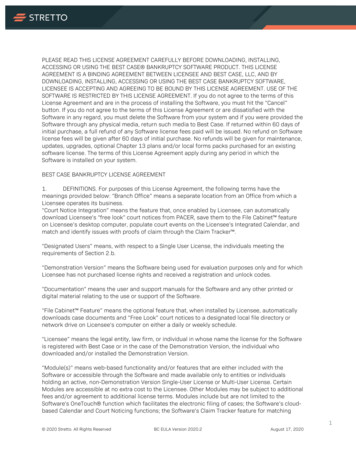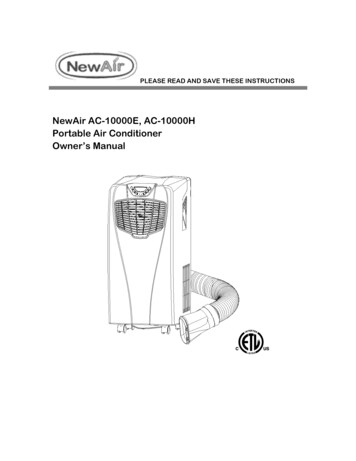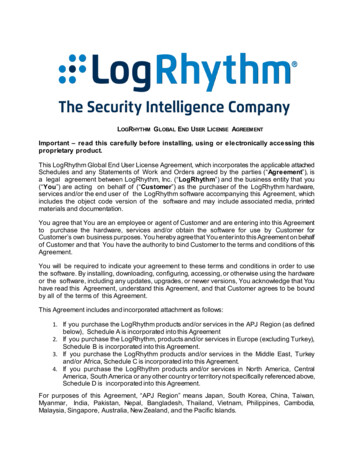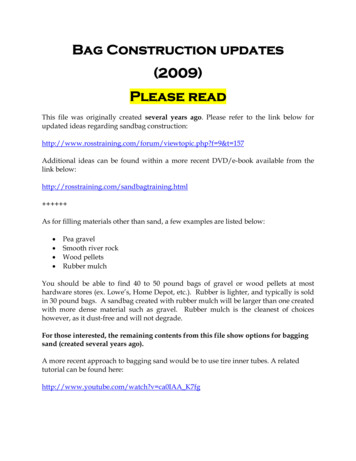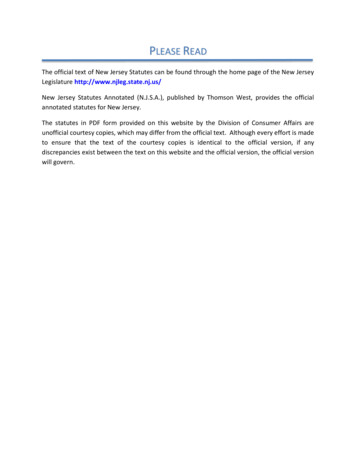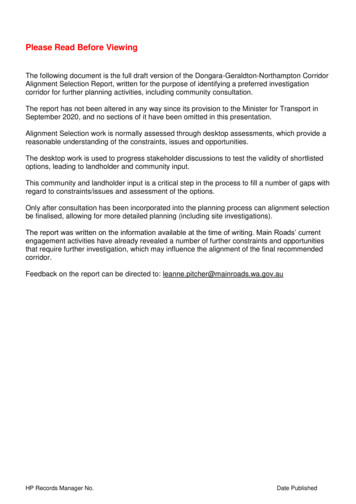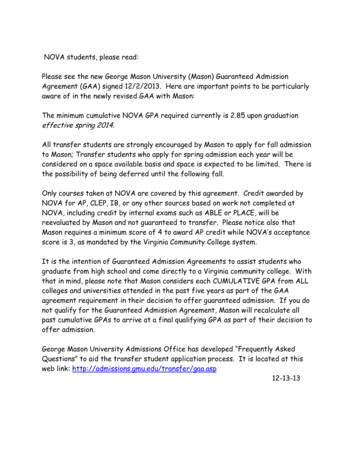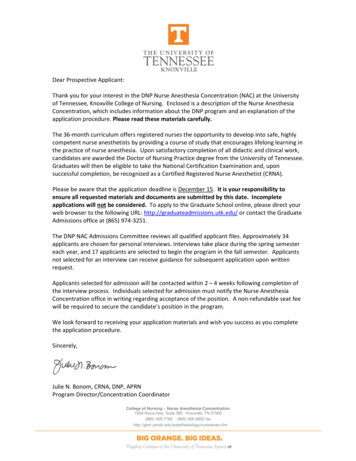
Transcription
Dear Prospective Applicant:Thank you for your interest in the DNP Nurse Anesthesia Concentration (NAC) at the Universityof Tennessee, Knoxville College of Nursing. Enclosed is a description of the Nurse AnesthesiaConcentration, which includes information about the DNP program and an explanation of theapplication procedure. Please read these materials carefully.The 36-month curriculum offers registered nurses the opportunity to develop into safe, highlycompetent nurse anesthetists by providing a course of study that encourages lifelong learning inthe practice of nurse anesthesia. Upon satisfactory completion of all didactic and clinical work,candidates are awarded the Doctor of Nursing Practice degree from the University of Tennessee.Graduates will then be eligible to take the National Certification Examination and, uponsuccessful completion, be recognized as a Certified Registered Nurse Anesthetist (CRNA).Please be aware that the application deadline is December 15. It is your responsibility toensure all requested materials and documents are submitted by this date. Incompleteapplications will not be considered. To apply to the Graduate School online, please direct yourweb browser to the following URL: http://graduateadmissions.utk.edu/ or contact the GraduateAdmissions office at (865) 974-3251.The DNP NAC Admissions Committee reviews all qualified applicant files. Approximately 34applicants are chosen for personal interviews. Interviews take place during the spring semestereach year, and 17 applicants are selected to begin the program in the fall semester. Applicantsnot selected for an interview can receive guidance for subsequent application upon writtenrequest.Applicants selected for admission will be contacted within 2 – 4 weeks following completion ofthe interview process. Individuals selected for admission must notify the Nurse AnesthesiaConcentration office in writing regarding acceptance of the position. A non-refundable seat feewill be required to secure the candidate’s position in the program.We look forward to receiving your application materials and wish you success as you completethe application procedure.Sincerely,Julie N. Bonom, CRNA, DNP, APRNProgram Director/Concentration CoordinatorCollege of Nursing – Nurse Anesthesia Concentration1934 Alcoa Hwy, Suite 365 Knoxville, TN 37920(865) 305-7762 (865) 305-6852 fm
ADMISSION REQUIREMENTSDNP NURSE ANESTHESIA CONCENTRATIONNOTE: All application materials must be uploaded into the online graduate application. Please to-graduate-school/ Submit online application to the UT Graduate Admissions Office. Meet all admission requirements ofthe Graduate School, the College of Nursing, and the Nurse Anesthesia Concentration. Achieve a TOEFL score of at least 550 on the paper test or 80 on the Internet-based test if nativelanguage is not English. Hold a Bachelor of Science in Nursing from a regionally accredited program. Have a cumulative GPA for all degrees earned (including non-nursing degrees) of 3.0 or higher on a4-point scale. Only applicants with a cumulative GPA for all degrees earned of less than 3.3 musttake the Graduate Record Examination (GRE) and achieve a competitive score in the verbal andquantitative sections. A minimum combined score of 297 or greater on the two sections issuggested. No other examinations, such as the MAT, GMAT, LSAT or MCAT, are accepted. Have completed an undergraduate-level health assessment course. Hold or be eligible for licensure to practice nursing in Tennessee. Hold current Advanced Cardiac Life Support (ACLS) and Pediatric Advanced Life Support (PALS)certification prior to program matriculation. Certifications are not required to apply to the program. Complete the following prerequisite courses with a grade of “C” or better prior to programmatriculation. Completion is not required to apply to the program.1. NURS 511 Statistical Methods for Health Care Research (3 credit hours)2. NURS 505 Advanced Clinical Pharmacology (3 credit hours)NOTE: Equivalent graduate-level courses from other institutions may be accepted. A coursedescription and syllabus must be submitted to the program for approval prior to enrollment. Inaddition to equivalent content, courses must have been taken for graduate credit and must not havebeen used to meet the requirements of another degree. Course equivalency waiver is authorized atthe discretion of the College of Nursing Director of Graduate Studies. Write a 3-5 page typed personal essay addressing the applicant’s long-term professional andeducational goals, preparation (including your work experiences) for anesthesia education, andqualities that would make the applicant a good candidate for a career in Nurse Anesthesia.
Participate in a personal interview (by invitation only) with the DNP NAC Admissions Committeeonsite at the NAC Program Office located at UT Medical Center in Knoxville. Provide 3 graduate rating forms (references) from the following:1. A former nursing professor that is familiar with the applicant’s academic work2. The applicant’s immediate nursing supervisor in ICU that is responsible for completing theapplicant’s employee evaluation (i.e. ICU nurse manager)3. A physician who works directly with the applicant in the ICUNOTE: Rating forms will not be accepted from medical residents, fellows, clinical preceptors, teamleaders, shift leaders, or clinical nursing/unit educators. Forms are emailed to each reference viathe online application portal and completed online. Complete at least one year of current, full-time adult ICU nursing experience prior to the start of theprogram. Examples of adult critical care areas that meet this requirement include but are not limitedto: Surgical ICU, Trauma ICU, Cardiovascular ICU, Medical ICU, and Neuro ICU.NOTE: Nursing experience in the Emergency Department, Pediatric ICU, Neonatal ICU, OperatingRoom, Post-Anesthesia Care Unit, and Progressive Care Unit does not fulfill this requirement. Otherwork history may be considered on a case-by-case basis but must include experience in units wherenurses care for high acuity, critically ill patients at a 1:1 ratio who require invasive monitoring andthe administration of vasoactive drugs. For example, while it cannot supersede the adult ICUrequirement, Flight Nursing is considered highly complementary experience. Obtain CCRN certification prior to program matriculation. Certification is not required to apply to theprogram.NOTE: Other certifications such as Certified Nurse Operating Room (CNOR), Certified EmergencyNurse (CEN), Certified Flight Registered Nurse (CFRN) or other specialty certification areadvantageous, but they do not supersede the CCRN requirement.Notice to Applicants:Meeting the minimal requirements does not guarantee admission. The Nurse Anesthesia Concentrationis highly competitive. Successful applicants are highly motivated, typically have several years of criticalcare experience, strong GPAs, and many have taken additional courses in advanced sciences such asphysiology, organic chemistry, or biochemistry.Graduate education in nurse anesthesia is a major undertaking academically, professionally,emotionally, and financially. Applicants are strongly encouraged to research all aspects carefully. It isrecommended that you shadow with practicing CRNAs to observe and discuss the practice of nurseanesthesia prior to the time of personal admission interview.Due to the intensity and workload of the graduate curriculum and practicum, students are discouragedfrom working. If students elect to work part-time, they may do so as long as academic and clinicalperformance are not compromised.
It is a faculty expectation for beginning students to be academically prepared to undertake the advancedstudy of nursing, clinical, and basic sciences. The curriculum features the intensive use of informationaltechnology for educational purposes. All students must possess basic computer skills and equipmentprior to enrollment. These skills and equipment include, but are not limited to*:1.Use of word processing program as well as databases, and spread sheets such asMicrosoft Word, Excel, PowerPoint.2.Capability to send and receive e-mails and attachments to e-mail3.Access to the Internet, maintained at studentcost, for the duration of the program of study4.Use of anti-virus software, Adobe Acrobat Reader *Additional requirements may be imposed for all students with noticeCollege of Nursing – Nurse Anesthesia Concentration1934 Alcoa Hwy, Suite 365 Knoxville, TN 37920(865) 305-7762 (865) 305-6852 fm
PROGRAM AND CURRICULUM INFORMATIONDNP NURSE ANESTHESIA CONCENTRATIONHistoryThe Nurse Anesthesia Concentration (NAC) at UT Knoxville was established in 2000. A nurse anesthesiaeducational program has been in continuous operation at our primary clinical site since 1963. Studentscompleting the program prior to 1992 were awarded a Certificate in Nurse Anesthesia from theUniversity of Tennessee Memorial Hospital. In 1992, a graduate curriculum was initiated in concert withthe University of Tennessee, Memphis College of Nursing to award graduates a Master of Science inNursing. The establishment of a new and autonomous program of nurse anesthesia education withinthe College of Nursing at the Knoxville campus was finalized in the fall of 2000, and all studentstransitioned to the new program in July 2001. In June 2019, the program was approved to offer theDoctor of Nursing Practice degree for entry into practice. The inaugural DNP NAC cohort matriculates inAugust 2019 with an expected graduation date of August 2022. The program is fully accredited by theCouncil on Accreditation of Nurse Anesthesia Educational Programs and will undergo its nextreaccreditation visit in spring 2024.Program DesignThe DNP NAC curriculum is 36 months in duration, spanning 3 full academic years, including mini-terms(3-4 weeks during the month of May) and summer semesters. Prior to matriculating into the program,students must complete two prerequisite courses: N511 Statistical Methods for Health Care Research (3credit hours) and N505 Advanced Clinical Pharmacology (3 credit hours) or equivalent courses fromanother institution. The UT College of Nursing requires that all students enrolled in the DNP NACcomplete a triad configuration of courses from the DNP core, concentration core, and clinical core.The DNP NAC curriculum represents a true front-loaded didactic format with the emphasis on clinicalexperiences later in the overall curriculum. The program of study begins with foundational DNP andbasic sciences content. Basic anesthesia concepts are introduced in the Summer Year-1 semester in theclassroom alongside application of these concepts in the clinical setting. Year-2 transitions into moreadvanced DNP and anesthesia coursework and focuses on DNP project development andimplementation. Time in the clinical setting gradually increases over Year-2, and students focus on theprogression of simple to complex anesthesia clinical skills. The curriculum design encourages the studentto apply didactic concepts to a wide variety of clinical experiences. Emphasis is placed upon coordinatingthe acuity of the individual undergoing anesthesia with the skills and abilities of the student. Thenumber of clinical hours, experiences, and responsibilities increases over time. By the Summer Year-2semester students are more fully immersed in the clinical setting. The DNP Scholarly Project iscompleted in Fall Year-3, and emphasis shifts to clinical experiences and CRNA professional roledevelopment as well as preparation for the National Certification Exam.
COURSE DESCRIPTIONSDNP NURSE ANESTHESIA CONCENTRATIONN504 Advanced Health/Physical Assessment and Diagnostic Reasoning (3)Development of advanced assessment skills and diagnostic reasoning to determine client health statusand needs. Application of physiological, pathophysiological, and psychosocial concepts with implicationsfor advanced practice nursing.N604 Principles of Population Health (3)Exploration of concepts and competencies related to population health for advanced practice nursing.N610 Review and Critique of Scientific Literature (3)Development of competencies for critical analysis and synthesis of literature in selected focus areawithin nursing science.N612 Health and Healthcare Policy (3)Interdisciplinary examination of contemporary health, health problems and policy responses; publicpolicy decision-making processes; and multi-stakeholder perspectives, roles, influence, and interactions.N613 Nursing Leadership in Complex Systems (3)Analysis and evaluation of leadership in transforming health and healthcare in complex systems.N620 Philosophical and Theoretical Foundations for Practice (3)A critical examination of the philosophical, historical, and theoretical context of knowledge.N622 Evidence Based Practice I (3)Identification, critique, and evaluation of existing evidence related to clinical problem of interest todetermine best practices.N623 Population Health in a Global Society (3)Application of theory, research, and intervention strategies to improve global health.N624 Evidence Based Practice II (3)Examination of current practices in project design, management, implementation, evaluation andsustainability.N626 Health Systems Finance (3)Application of financial management concepts and techniques in decision-making in health servicesorganizations.N630 DNP Scholarly Project Proposal (2)Advanced planning for the DNP Scholarly Project.N633 DNP Practice Immersion (1-12)Individually designed practicum to implement and evaluate the DNP Scholarly Project.
N634 DNP Scholarly Project (3)Completion of the DNP Scholarly Project.N616 Chemistry and Physics for DNP Nurse Anesthesia (3)Integration and application of chemistry, physics, and biochemistry principles to nurse anesthesiapractice.N617 Clinical Anatomy for DNP Nurse Anesthesia (3)Application of foundational histological and gross anatomical principles for the safe delivery of nurseanesthesia care.N618 Clinical Anatomy Lab for DNP Nurse Anesthesia (1)Application of foundational histological and gross anatomical principles for the safe delivery of nurseanesthesia care through cadaveric and simulated experiences.N619 Physiology and Pathophysiology I (3)Comprehensive study of specific human organ systems’ physiologic and pathophysiologic concepts inhealth promotion and anesthetic care across the lifespan.N621 Physiology and Pathophysiology II (3)Comprehensive study of specific human organ systems’ physiologic and pathophysiologic concepts inhealth promotion and anesthetic care across the lifespan.N627 DNP Anesthesia Pharmacology (3)Detailed study of general pharmacological principles and medications for therapeutic decision-making innurse anesthesia clinical practice.N629 Basic Principles of DNP Anesthesia (3)Examination of technology, equipment, and basic principles for nurse anesthesia practice.N635 General Principles of DNP Anesthesia I (4)Anesthesia care management exploration in homeostasis, disease states, and organ systems’ diagnosticand surgical procedures based on basic sciences, evidence-based practice, and safety and quality’sconceptual frameworks.N636 General Principles of DNP Anesthesia II (4)Anesthesia care management exploration for special populations, homeostasis, disease states, anddiagnostic and surgical procedures based on basic sciences, evidence-based practice, and safety andquality’s conceptual frameworks.N637 General Principles of DNP Anesthesia III (4)Anesthesia care management exploration for acute and chronic pain, radiological principles, and safepractices in non-operating room anesthesia experiences.N638 DNP Anesthesia Seminar (2; will repeat x 4)Extensive exploration of standards of care, safety and quality, emerging issues, technological, economicand legal regulation and critical appraisal of nurse anesthesia’s professional role.
N640 DNP Anesthesia Clinical Practicum I (1)Integration of anesthetic theoretical underpinnings by the “novice” nurse anesthesia clinical student inperioperative preparation and evaluation of equipment, medications, patient risk stratification andairway management.N641 DNP Anesthesia Clinical Practicum II (3)Integration of anesthetic theoretical underpinnings by the “novice” nurse anesthesia clinical student inASA I patients’ anesthetic care.N642 DNP Anesthesia Clinical Practicum III (6)Integration of anesthetic theoretical underpinnings by the “advanced beginner” nurse anesthesia clinicalstudent in ASA IE and II patients’ anesthetic care.N643 DNP Anesthesia Clinical Practicum IV (4)Integration of anesthetic theoretical underpinnings by the “advanced beginner” nurse anesthesia clinicalstudent in ASA IIE and III patients’ anesthetic care.N644 DNP Anesthesia Clinical Practicum V (7)Integration of anesthetic theoretical underpinnings by the “competent” nurse anesthesia clinical studentin ASA IIIE and IV patients’ anesthetic care and subspecialty surgical, diagnostic, and anesthesiaprocedures.N645 DNP Anesthesia Clinical Practicum VI (9)Integration of anesthetic theoretical underpinnings by the “competent” nurse anesthesia clinical studentin ASA IVE and V patients’ anesthetic care, and subspecialty surgical, diagnostic, and anesthesiaprocedures.N646 DNP Anesthesia Clinical Practicum VII (2)Integration of anesthetic theoretical underpinnings by the “proficient” nurse anesthesia clinical studentfor the ASA VE and ASA VI patients’ anesthetic care and subspecialty surgical, diagnostic, and anesthesiaprocedures.N647 DNP Anesthesia Clinical Practicum VIII (6)Integration of anesthetic theoretical underpinnings by the “expert” nurse anesthesia clinical student forpatients across the lifespan and subspecialty surgical, diagnostic, and anesthesia procedures.College of Nursing – Nurse Anesthesia Concentration1934 Alcoa Hwy, Suite 365 Knoxville, TN 37920(865) 305-7762 (865) 305-6852 fm
of Tennessee, Knoxville College of Nursing. Enclosed is a description of the Nurse Anesthesia Concentration, which includes information about the DNP program and an explanation of the application procedure. Please read these materials carefully. The 36-month curriculum offers regis
